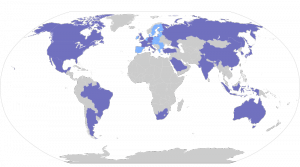The G-20 Meeting in London this week is a reminder that many of us do not know exactly who it is that is getting together to squabble our way to one world government. Here are definitions of G-7, G-8 and G-20 from Wikipedia:
The G7 (also known as the G-7 or Group of Seven) is the meeting of the finance ministers from a group of seven industrialized nations. It was formed in 1976, when Canada joined the Group of Six: France, Germany, Italy, Japan, United Kingdom, and United States. The finance ministers of these countries meet several times a year to discuss economic policies. Their work is supported by regular, functional meetings of officials, including the G7 Finance Deputies.
The Group of Eight (G8, and formerly the G6 or Group of Six) is a forum, created by France in 1975, for governments of eight nations of the northern hemisphere: Canada, France, Germany, Italy, Japan, Russia, the United Kingdom, and the United States; in addition, the European Union is represented within the G8, but cannot host or chair. “G8” can refer to the member states or to the annual summit meeting of the G8 heads of government.
The G-20 (more formally, the Group of Twenty Finance Ministers and Central Bank Governors) is a group of finance ministers and central bank governors from 20 economies: 19 of the world’s largest national economies, plus the European Union (EU). It also met once at heads-of-government level, in November 2008. Collectively, the G-20 economies comprise 85% of global gross national product, 80% of world trade (including EU intra-trade) and two-thirds of the world population.
In 2009, there are 20 members of the G-20. These include the finance ministers and central bank governors of 19 countries: Argentina, Australia, Brazil, Canada, China, France, Germany, India, Indonesia, Italy, Japan, Mexico, Russia, Saudi Arabia, South Africa, South Korea, Turkey, United Kingdom, United States. The 20th member is the European Union, which is represented by the rotating Council presidency and the European Central Bank.
In addition to these 20 members, the following forums and institutions, as represented by their respective chief executive officers, participate in meetings of the G-20: International Monetary Fund, World Bank,
International Monetary and Financial Committee and Development Committee of the IMF and World Bank.






“We know we originate with God, but the whole world is lying in the [power of the] wicked one.” 1John 5:19
I have also wondered about the economic Group of Ten which participate in the General Arrangements to Borrow and also supply resources to the IMF. It, too, like the G20 is attended by the Finance Ministers as well as the Central Bank Governors. However, its membership is not all inclusive in the G20. Belgium, Netherlands, Sweden, and Switzerland are not part of the G20. As this small group funds the IMF and is part of the Bank of International Settlements, and OECD, I wonder how influential this group really is in influencing the world economy? I wonder if this is where the real power seat lies?